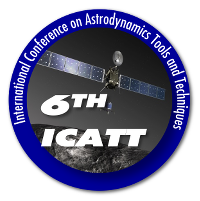Speaker
Dr
Lamberto Dell'Elce
(Université de Liège)
Description
Thanks to high-fidelity ephemeris and detailed gravitational maps, third-body and non-spherical gravitational perturbations can be modeled with sufficient precision for most applications in low-Earth orbit (LEO). On the contrary, owing to severe uncertainty sources and modeling limitations, mathematical models of the main non-gravitational forces – namely, aerodynamics and solar radiation pressure (SRP) – are generally biased even when advanced formulations are considered.
To date, accurate satellite drag and SRP estimation is only envisaged in challenging missions and the recursive estimation of non-gravitational forces is generally carried out by means of high-sensitivity accelerometers. Nonetheless, unmodeled force estimators using satellite observations only were also proposed. The method of dynamical model compensation (DMC) is arguably the most popular example of this class: first, an underlying parametric model of the unknown perturbation is adopted; then, the parameters of such model are assumed to be first-order Gauss-Markov processes and they are appended to the state vector of a recursive estimator (most often an extended Kalman filter). Provided accurate and sufficiently dense satellite observations, DMC was successfully applied to the estimation of atmospheric force. In that study, no other process noise but the one in the atmospheric force itself was considered.
In the broader context of Bayesian estimation of dynamical systems, sequential Monte Carlo (SMC) algorithms – which include the popular particle filters – are valuable tools to optimally approximate the posterior distribution of hidden Markov processes. Compared to Kalman filtering techniques, particle filters do not require any assumption on neither the linearity of the system nor the nature of the noise. SMC was used to tackle several problems in astrodynamics but, to the best of our knowledge, it was not applied to non-gravitational force estimation, yet.
In this paper, *we propose an SMC algorithm for the recursive inference of non-gravitational perturbations from satellite observations* with no supporting in-situ acceleration measurements. Our approach is conceptually similar to DMC but, on the top of the previously mentioned advantages and drawbacks of SMC, we show that it provides good estimates of the non-gravitational perturbations even when fairly inaccurate measurements and a modest underlying propagator are used. The filter works by updating the empirical distribution of a prescribed number of weighted particles. Each particle consists of one set of orbital elements and some parameters involved in the computation of the forces, e.g., drag and reflectivity coefficients. Weights are assigned to the particles based on the agreement between propagated orbital elements and observations. Secular effects of the non-gravitational perturbations allow “good” particles to emerge when the weights are updated.
Mean orbital elements are exploited as measurements. They can be obtained by either converting GPS states with a contact transformation or using two-line elements (TLE). This feature allows analytical and semi-analytical propagators, e.g., SGP4, to be naturally integrated in the algorithm to propagate particles. For these reasons, this work can be a valuable resource both for space situational awareness applications, e.g., space debris' characterization from TLE, and to enhance short-term trajectory predictions on-board small satellites.
| Applicant type | First author |
|---|
Primary author
Dr
Lamberto Dell'Elce
(Université de Liège)
Co-authors
Dr
Ohad Ben-Yaacov
(Technion - Israel Institute of Technology)
Prof.
Pini Gurfil
(Technion - Israel Institute of Technology)

